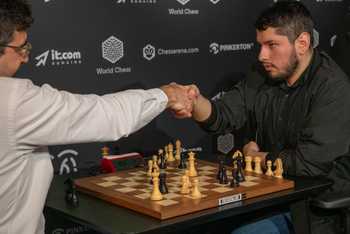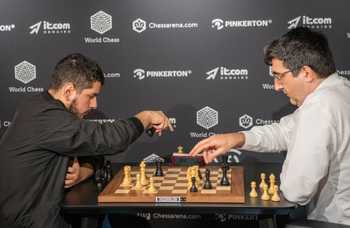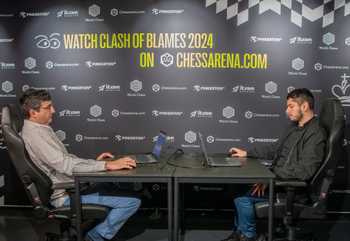In the grand tradition of chess — the ultimate game of strategic depth and intellectual prowess —Pinkerton joined with World Chess, a London-based chess gaming and entertainment company, as the official Fair Play Partner at the "Clash of Blames" event in London from August 19-21, 2024. This highly anticipated rematch between Grandmasters Vladimir Kramnik and José Martínez Alcántara, known online as Jopsem, was not just a testament to the enduring legacy of the game but also to the unyielding commitment to event integrity that Pinkerton shares with the global chess community.

The Clash of Claims and the Clash of Blames
The chess world was rocked by controversy in June 2024 during the chess titans’ first match, The Clash of Claims, a hybrid tournament format featuring a mix of face-to-face and online chess games where Martinez defeated Kramnik 14.5-11.5. Significant technical glitches—including problems with clock synchronization and failed software updates—led to disputes and allegations of cheating. The Clash of Blames rematch between Kramnik and Martinez was a three-day, 36-game showdown once again featuring both face-to-face and online chess matches, hosted at the online FIDE arena with increased anti-cheating measures. Kramnik won 19:17. Working with World Chess organizers, Pinkerton Director Rory Lamrock was instrumental in implementing anti-cheating and advanced event security solutions, such as technical surveillance countermeasures (TSCM) bug sweeps and metal detectors, searching for electronic devices that could be used to create a competitive advantage.
“From phones and in-ear listening devices to vibrators, high-level chess matches have seen allegations of a multitude of hidden devices that we needed to screen out,” Lamrock said. Additionally, Pinkerton was onsite to administer polygraph tests when required.
“Polygraphs, which track physiological responses to help detect deception, are valuable tools often used by law enforcement, government, and corporate security teams as part of an investigative strategy. They work alongside evidence, witness statements, and data analysis to ensure fairness and integrity,” said Lamrock. “Using the polygraph as part of our strategy to promote fair play reinforces accountability and trust in both the players and match procedures, ensuring that the world of chess maintains its commitment to fairness.”
Ilya Merenzon, CEO of World Chess, echoed this sentiment, recognizing the gravity of cheating in chess and the importance of Pinkerton's role: "By partnering with Pinkerton, a global leader in security and risk management, we are taking a definitive stand against this issue." The presence of a Pinkerton agent was a bold statement and symbol of vigilance that resonates with Pinkerton's core values. Lamrock emphasized, “Integrity, vigilance, and excellence are not just a part of Pinkerton's history, they are the heartbeat that drives every investigation and defines the Agency's legacy.”
Event Integrity Enforcement
“Live events, both streamed and in-person, attract huge audiences. Physical safety at the event is no longer the only concern. Event organizers need to worry about brand impact, user or customer confidence, and minimizing disruption,” said Lamrock. Pinkerton first partnered with World Chess in 2019, and the setup was very different. The tournament was open to the public, with hundreds of people in and out of the venue over 5 days. There was a larger venue to secure, and Pinkerton deployed a broader range of technical equipment and security personnel to enforce fair play measures.
The Clash of Blames is the first event that Pinkerton has conducted specifically for anti-cheating initiatives. This match took place at a purpose-built gaming and live-streaming event studio in East London. The venue itself was closed to the public. Only players, match arbiters, and some technical staff were allowed in, and even then, access was restricted to the playing area. “The atmosphere was tense given the stakes at play, but the room was silent and focused allowing the players to concentrate,” said Lamrock.

Integrity and Fair Play in Chess and eSports
Integrity and fair play are the bedrock of sports, serving as the foundation for competition. Fair play ensures that all participants are on a level playing field, so to speak, where success is determined by skill, strategy, and perseverance, rather than deceit or cheating. Upholding these principles fosters respect among players, officials, and fans, and preserves the honor and enjoyment of any sport. Without integrity and fair play, the very essence of competition is compromised, eroding trust, and diminishing the value of achievements. They are critical for maintaining sports' credibility and inspiring current and future generations to engage in and cherish these activities. Chess is no exception.
Cheating in chess has been a concern for decades, with instances such as Bobby Fischer's accusations of collusion during the 1962 Candidates Tournament hinting at the issue's longstanding nature. In the era of technology, cheating in chess has become more complex and seemingly more prevalent. Advanced chess engines and the popularity of online chess have increased the opportunities for dishonest play. Recent allegations have resulted in notable controversies, leading to legal disputes totaling some $100 million and affecting the reputations of those involved.
“Cheating is obviously a danger, as we know from many other cyber sports, e-sport games, and general sports. A lot of money and human resources are spent to secure the integrity of the sport, whether it's e-sport or regular sport. I believe we have to follow this in chess. We are, by far, not doing enough in this direction,” said Grandmaster Vladimir Kramnik, the 14th World Chess Champion. The same can be said about other eSports, also known as electronic sports or competitive video gaming where players and teams compete against each other primarily in multiplayer online games. Along with chess, eSports has grown exponentially in popularity over the past decade, with college and professional teams, tournaments, and dedicated millions of fans. Revenue from competitions has reached billions of dollars, driven by sponsorships, advertising, media rights, and ticket sales.
Cheating in eSports, similar to any competitive environment, undermines the integrity of the competition and fairness of the sport. Players use clickers in some games. Cheating may also come in the form of match-fixing or manipulating the outcome of games. And like chess, players may also create fake accounts or share accounts, allowing a more skilled player to play on someone else’s account to artificially inflate rankings.
Taking a Polygraph Test
Few chess players have been as outspoken about cheating as Kramnik, who faced allegations of cheating himself during the 2006 World Championship match against Veselin Topalov, whose team accused Kramnik of receiving computer assistance during games. Following The Clash of Blames, Kramnik voluntarily took a polygraph test, facilitated by a Pinkerton polygraph expert, setting a precedent and reinforcing the need for trust and transparency at the highest levels of competition. He was asked three questions:
Did Kramnik communicate in any way designed to assist him in cheating during the 2006 World Chess Championship against Topalov? (Answer: NO)Has Kramnik cheated in any online chess games or tournaments since June 2019? (Answer: NO)Has Kramnik ever been offered a bribe to deliberately lose a chess match since becoming a top 10 player? (Answer: YES)
The Grandmaster was found to be truthful on all accounts, supporting Kramnik's integrity and the effectiveness of the polygraph test. “There is not enough being done in the world of chess, and I wanted to take this initiative to raise awareness that this is absolutely necessary,” Kramnik said. “It’s a very big, existential threat to chess, as the World Champion Magnus Carlsen mentioned, and I agree with him. I hope that all players, at least those who have nothing to hide, will follow me, and together we will move forward in this direction.”

World Chess is working to increase trust and transparency in the game and has launched an initiative to roll out polygraphing as a voluntary measure to the world’s top 100 players, similar to anti-doping initiatives in other high-level sports. “Cheating allegations have cast a shadow over chess for too long. By introducing voluntary polygraph testing, we are taking a decisive step to protect the integrity of our beloved sport. This initiative not only supports honest players but also strengthens the public’s trust in chess as a fair game,” said Ilya Merenzon, CEO of World Chess.
“In high-stakes situations like the recent Carlsen-Niemann controversy, where resolutions remain elusive and speculation runs rampant, a reliable polygraph test—if mutually agreed upon by all parties—could decisively resolve the conflict. Such a measure would provide players, the public, and chess organizers with clear, definitive information, effectively ending any lingering doubts and putting the focus back on the game itself,” said Merenzon. According to Kramnik, he believes that players and fans alike will welcome the extra measures and cheat-free security solutions, including the polygraph test, because it's important for the public to know that everyone is playing fair, that the achievements of every player are justified, and that they are simply better and not using any external help.
Sports Event Security Services and Advance Event Security Solutions
In a world where sports integrity is more important than ever, Pinkerton's involvement in the "Clash of Blames" is a testament to the agency's dedication to upholding the highest standards of fair play. It is a commitment that transcends chess and speaks to the essence of competition: a fair chance for all to play, strategize, and win on an even field.
"Cheating undermines the intellectual rigor and strategic expertise that the game is revered for," Lamrock stated. ”For the Clash of Blames, we spent time getting to understand the ins and outs of high-level chess and how players could feasibly cheat. We designed a robust strategy around that. We would welcome the opportunity to work with World Chess again.” For those seeking to promote honesty and integrity, Pinkerton stands ready with a comprehensive approach to sports integrity services for events.


